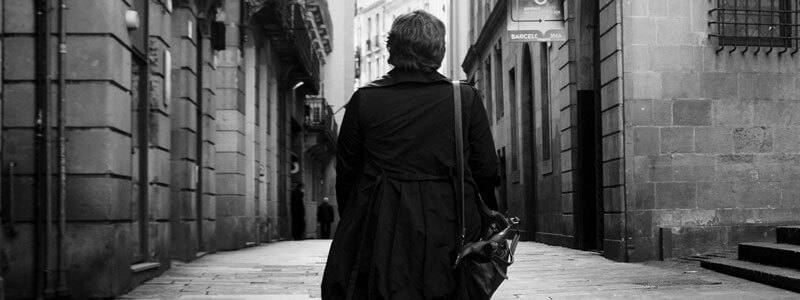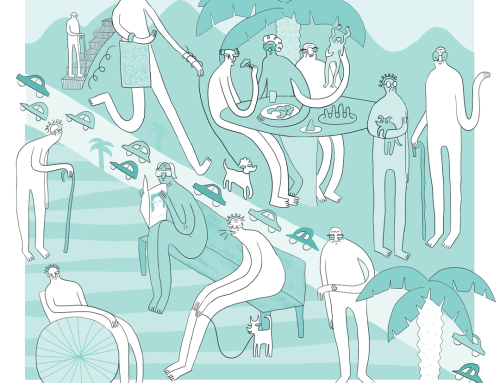Filmmaker Pau Faus looks like he could use another game of ping-pong. He played his first match six months ago, just after he arrived to work with Nanouk Films’ editors and engineers. Their task was to boil down 200 hours of footage into an hour-and-a-half film documenting Ada Colau’s rebel campaign to become Barcelona’s first female mayor. Now, gaunt and pale, Faus was nevertheless possessed by a giddy talkativeness of a man who sees relief at hand.
“This table is an institution,” he tells me as we sit down at Nanouk Films headquarters in l’Eixample on a rainy April Wednesday. “When there are meetings that get a little tense and you have to unwind, it momentarily becomes a ping-pong table. I only played my first day here. I thought it would be a daily thing, but I lost and that was that.”
Besides losing his debut, there hasn’t been time for a rematch. “It’s been frenetic,” he said. “We did something that I wouldn’t really recommend, which was filming as much as we could and then later deciding what to use.” So only the biggest white lie in journalism, my insincere pledge of a “brief chat of, oh, about 20 minutes,” had lured him away from putting the finishing touches on Alcaldessa to get it ready for its premier at the Malaga Film Festival on April 28. Its first showing in Barcelona will come at DocsBarcelona on May 26, two days after the anniversary of Colau’s dark-horse victory.
Faus, a 41-year-old independent filmmaker from Barcelona specializing in art and activism, met Colau when he joined the Plataforma d’Afectats per la Hipoteca (PAH) she helped found to fight for homeowners hit hard by Spain’s recession. More a “member of the PAH family” than a “friend,” Faus said Colau had rightfully earned her crusader mystique based on her long track record of fighting against evictions. (Let’s get this one out of the way: funding for the film was provided by a grant from the Generalitat, the Rosa Luxemburg Foundation in Germany, and Nanouk Films, not from Colau or the PAH.) He made videos for the PAH and, eventually, a short documentary on the activist group. And when Colau, from completely outside the established political circles, decided to leverage her popularity into a run at the mayor’s seat with Barcelona en Comú, Faus had a hunch that it could be the stuff of his first full-length feature and would “not compare in any way with anything I had done before.”
Colau agreed to give him what he described as “privileged access” to follow her on the “journey” of “moving from an activist with a megaphone on one extreme to the mayor on the other.” He set himself the double goal of telling “a universal story of people who organize and win against the odds, and, on the other hand, about a person who decides to become that which she had questioned on many occasions.”
An early believer, Faus recalled a family dinner at Christmas 2014, when his relatives scoffed at Colau’s chances to oust incumbent Xavier Trias. “I insisted that there was going to be a chance for this voice, something which turned out to be true. Spending all that time in the PAH showed me this story could be powerful.”
Interspersed between scenes from the campaign, the strength of the film, according to its maker, is the inclusion of a video diary that Colau used to express her personal reactions. In one of those diaries, Colau speaks to the camera with a black backdrop, giving the moment the gloomy feel of a Catholic confessional. She says, “I am very afraid that I won’t like being in a political campaign, being a candidate or being mayor, but I think it is worth taking the plunge.”
“In those sessions of the video diary we sometimes had to ask her questions, but other times we just turned on the camera, said ‘hello, how are you’ and she was blah, blah, blah for half an hour,” Faus said. “These moments were a time-out, therapeutic almost.”
Besides its underdog narrative, Faus said Alcaldessa is at heart a dissection of Colau’s mutation from outsider to insider, her struggle to maintain her own ideals while crossing over to the ambiguous, but potentially much more effective realm of government. In that sense the film promises to reveal the roots of tensions that have emerged in her first year in office: think about Colau battling against the city’s metro workers in their strike during a Mobile World Congress she had once derided as a candidate.
“She talks about how she is realizing she is becoming a figure associated with power”. For example, he said Colau became aware during the campaign that while sharing doubts and emotions is where “social activism gets its strength,” doing so in politics is tantamount to “weakness” and thus taboo. “These moments show very well the transition of this person who is divided between two worlds,” Faus said.
As to the chances his film has to win over her detractors, Faus is skeptical. He is vehement, however, that those same political elites who believe she is an intruder are the very ones who made her eruption possible through their own poor governance. “Ada Colau is an example of our time,” he said. “Through her we can read what has happened in Spain for the past decade.”





